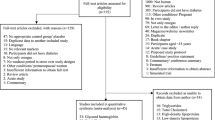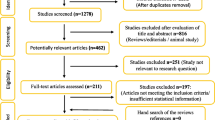Abstract
Objective
Studies in rodents and humans have indicated that omega-3 polyunsaturated fatty acids (n-3 PUFA) may reduce weight. The aim of this meta-analysis was to evaluate evidence for the efficacy of n-3 PUFA in managing overweight and obesity.
Methods
We performed a systematic search of PubMed, Embase, and Cochrane Central Register of Controlled Trials until May 2015. Two reviewers independently determined the eligibility of studies and assessed the reporting quality of included randomized controlled trials (RCTs).
Results
A total of 11 RCTs involving 617 participants were included in this meta-analysis. Based on the meta-analysis of nine studies, a statistically nonsignificant difference was revealed in weight loss between n-3 PUFA and placebo (p=0.99; weighted mean difference [WMD]: 0.00; 95% confidence interval [CI] −0.42 to 0.43), whereas n-3 PUFA was superior to placebo in reducing serum triglyceride levels (p=0.0007; standard median difference [Std MD]: −0.59; 95% CI −0.93 to −0.25). Based on meta-analysis of seven studies, the analysis of aggregated data showed a significant reduction in waist circumference (p=0.005; WMD: −0.53; 95% CI −0.90 to −0.16). There were no significant differences in body mass index, total serum levels of cholesterol, low density lipoprotein cholesterol, high density lipoprotein cholesterol, and fasting glucose levels.
Conclusions
The evidence from RCTs showed that n-3 PUFA might effectively reduce waist circumference and triglyceride levels in overweight and obese adults, but n-3 PUFA may not effectively reduce body weight. Given the small number and poor quality of RCTs included in the meta-analysis, these results are inconclusive. A large-scale, well-designed RCT is needed to further address this issue..




Similar content being viewed by others
References
Swinburn BA, Sacks G, Hall KD, McPherson K, Finegood DT, Moodie ML, at al. The global obesity pandemic: shaped by global drivers and local environments. Lancet 2011;378:804–814
de Luis DA, Aller R, Izaola O, Gonzalez Sagrado M, Bellioo D, Conde R. Effects of a low-fat versus a low-carbohydrate diet on adipocytokines in obese adults. Horm Res 2007;67:296–300
de Luis DA, Pacheco D, Izaola O, Terroba MC, Cuellar L, Martin T. Clinical results and nutritional consequences of biliopancreatic diversion: three years of follow-up. Ann Nutr Metab 2008;53:234–239
Van Gaal LF, Wauters MA, DeLeeuw IH. The beneficial effects of modest weight loss on cardiovascular risk factors. Int J Obes Relat Metab Disord 1997;21: S5–9
Kris-Etherton PM, Harris WS, Appel LJ. Omega-3 fatty acids and cardiovascular disease: new recommendations from the American Heart Association. Arterioscler Thromb Vasc Biol 2003;23:151–152
Pittaway JK, Chuang LT, Ahuja KD, Beckett JM, Glew RH, Ball MJ. Omega-3 dietary Fatty Acid status of healthy older adults in Tasmania, Australia: an observational study. J Nutr Health Aging 2015;19:505–510
Graham I, Atar D, Borch-Johnsen K, Boysen G, Burell G, Cifkova R, et al. European guidelines on cardiovascular disease prevention in clinical practice: full text. Fourth Joint Task Force of the European Society of Cardiology and other societies on cardiovascular disease prevention in clinical practice (constituted by representatives of nine societies and by invited experts). Eur J Cardiovasc Prev Rehabil 2007;14: S1–113
Lavie CJ, Milani RV, Mehra MR, Ventura HO. Omega-3 polyunsaturated fatty acids and cardiovascular diseases. J Am Coll Cardiol 2009;54:585–594
Flachs P, Horakova O, Brauner P, Rossmeisl M, Pecina P, Franssen-van Hal N, et al. Polyunsaturated fatty acids of marine origin upregulate mitochondrial biogenesis and induce beta-oxidation in white fat. Diabetologia 2005;48:2365–2375
Ruzickova J, Rossmeisl M, Prazak T, Flachs P, Sponarova J, Veck M, et al. Omega-3 PUFA of marine origin limit diet-induced obesity in mice by reducing cellularity of adipose tissue. Lipids 2004;39:1177–1185
Minami A, Ishimura N, Sakamoto S, Takishita E, Mawatari K, Okada K, et al. Effect of eicosapentaenoic acid ethyl ester v. oleic acid-rich safflower oil on insulin resistance in type 2 diabetic model rats with hypertriacylglycerolaemia. Br J Nutr 2002;87:157–162
Raclot T, Groscolas R, Langin D, Ferré P. Site-specific regulation of gene expression by n-3 polyunsaturated fatty acids in rat white adipose tissues. J Lipid Res 1997;38:1963–1972
Buckley JD, Howe PR. Anti-obesity effects of long-chain omega-3 polyunsaturated fatty acids. Obes Rev 2009;10:648–659
Chan DC, Watts GF, Mori TA, Barrett PH, Redgrave TG, Beilin LJ. Randomized controlled trial of the effect of n-3 fatty acid supplementation on the metabolism of apolipoprotein B-100 and chylomicron remnants in men with visceral obesity. Am J Clin Nutr 2003;77:300–307
Krebs JD, Browning LM, McLean NK, Rothwell JL, Mishra GD, Moore CS, at al. Additive benefits of long-chain n-3 polyunsaturated fatty acids and weight-loss in the management of cardiovascular disease risk in overweight hyperinsulinaemic women. Int J Obes 2006;30:1535–1544
Kunesová M, Braunerová R, Hlavatý P, Tvrzická E, Stanková B, Skrha J, et al. The influence of n-3 polyunsaturated fatty acids and very low calorie diet during a shortterm weight reducing regimen on weight loss and serum fatty acid composition in severely obese women. Physiol Res 2006;55:63–72
Thorsdottir I, Tomasson H, Gunnarsdottir I, Gisladottir E, Kiely M, Parra MD, et al. Randomized trial of weight-loss-diets for young adults varying in fish and fish oil content. Int J Obes 2007;31:1560–1566
Hill AM, Buckley JD, Murphy KJ, Howe PR. Combining fish-oil supplements with regular aerobic exercise improves body composition and cardiovascular disease risk factors. Am J Clin Nutr 2007;85:1267–1274
DeFina LF, Marcoux LG, Devers SM, Cleaver JP, Willis BL. Effects of omega-3 supplementation in combination with diet and exercise on weight loss and body composition. Am J Clin Nutr 2011;93:455–462
Gammelmark A, Madsen T, Varming K, Lundbye-Christensen S, Schmidt EB. Low-dose fish oil supplementation increases serum adiponectin without affecting inflammatory markers in overweight subjects. Nutr Res 2012;32:15–23
Munro IA, Garg ML. Dietary supplementation with n-3 PUFA does not promote weight loss when combined with a very-low-energy diet. Br J Nutr 2012, 108, 1466–1474
Munro IA, Garg ML. Prior supplementation with long chain omega-3 polyunsaturated fatty acids promotes weight loss in obese adults: a double-blinded randomised controlled trial. Food Funct 2013;4:650–658
Munro IA, Garg ML. Dietary supplementation with long chain omega-3 polyunsaturated fatty acids and weight loss in obese adults. Obes Res Clin Pract 2013;7:173–181
Spencer M, Finlin BS, Unal R, Zhu B, Morris AJ, Shipp LR, et al. Omega-3 fatty acids reduce adipose tissue macrophages in human subjects with insulin resistance. Diabetes 2013;62:1709–1717
Buckley JD, Howe PR. Long-chain omega-3 polyunsaturated fatty acids may be beneficial for reducing obesity-a review. Nutrients 2010;2:1212–1230
Hajer GR, van Haeften TW, Visseren FL. Adipose tissue dysfunction in obesity, diabetes, and vascular diseases. Eur Heart J 2008;29:2959–2971
Wadden TA, Butryn ML, Wilson C. Lifestyle modification for the management of obesity. Gastroenterology 2007;132:2226–2238
B. Vellas, I. Carrie, S. Gillette-Guyonnet, J. Touchon, T. Dantoine, J.F. Dartigues, et al. MAPT study: a multidomain approach for preventing Alzheimer’s disease: design and baseline data. J Prev Alz Dis 2014;1:13–22
Ioannidis JP, Evans SJ, Gøtzsche PC, O’Neill RT, Altman DG, Schulz K, Moher, D. Better reporting of harms in randomized trials: an extension of the CONSORT statement. Ann Intern Med 2004;141:781–788
Burdge GC, Wootton SA. Conversion of alpha-linolenic acid to eicosapentaenoic, docosapentaenoic and docosahexaenoic acids in young women. Br J Nutr 2002;88:411–420
Author information
Authors and Affiliations
Corresponding author
Rights and permissions
About this article
Cite this article
Zhang, Y.Y., Liu, W., Zhao, T.Y. et al. Efficacy of omega-3 polyunsaturated fatty acids supplementation in managing overweight and obesity: A meta-analysis of randomized clinical trials. J Nutr Health Aging 21, 187–192 (2017). https://doi.org/10.1007/s12603-016-0755-5
Received:
Accepted:
Published:
Issue Date:
DOI: https://doi.org/10.1007/s12603-016-0755-5




